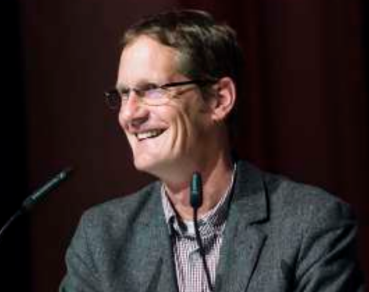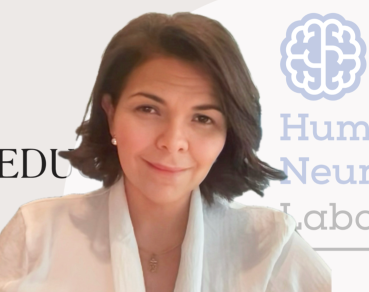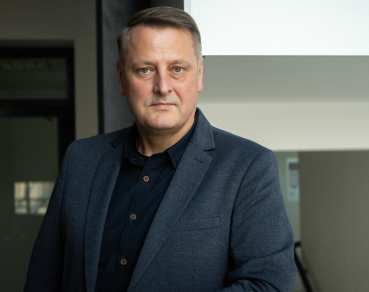ERD 2024 Conference Program
ERD 2025 will be held physically, in Cluj-Napoca, on May 15, 2025
"Education, Reflection, Development" Conference Program (June 06, 2024)
10:00 - 10:15 > Conference opening
10:15 - 12:00 > Keynote speakers

Stefan Jeuk, Ph.D.
Ludwigsburg University of Education, Germany

Patrícia Oliveira-Silva, Ph.D.
Universidade Católica Portuguesa, Portugal

Remigijus Bubnys, Ph.D.
Vilnius University Šiauliai Academy, Lithuania
Multilingualism in Monolingual Schools, Stefan Jeuk.
Neuroscience Insights: Bridging Integral Student Development and Holistic Education, Patrícia Oliveira-Silva.
Reflection for Professional Growth in Teacher Education and In-Service Training: Challenges and Opportunities, Remigijus Bubnys.
12:00 - 12:30 > Break
12:30 - 14:30 > Communications by sections (as following)
14:30 - 15:00 > Break
15:00 - 17:00 > Workshop: Artificial intelligence applied in Higher Education, Patrícia Oliveira-Silva, Ana Moreno & Pedro Ribeiro.
Section 1: Trends and expertise in early childhood education and digital education
DetailsSection 2: Didactic approaches in the contemporary school
DetailsSection 3: Challenges for 21st century education
DetailsSection 4: Empowering Educators for Effective Teaching and Learning
DetailsNote that: The recommended time for each communication is 10 minutes for presentation + 5 minutes for discussions. It is recommended for the presentation to be accompanied by a digital support, such as power-point. Please upload your presentation in the cloud storage before the section begins.
Section 1: Trends and expertise in early childhood education and digital education
Moderators:
Constantina Catalano, Ph.D., Babeș-Bolyai University
Marius Bănuț, Ph.D., Babeș-Bolyai University
- Viktorija Tataurova, Jekaterina Raka. The use of Chat GPT in ESP course design and implementation
- Yunying Guo, Xiaofei Li. Research on Blended teaching of Artificial Intelligence and Machine Learning
- Tamara Takács. Kindergarten teachers' professional commitment to Baptist Charity Nursery School
- Esther Kevelson, Constantin Cucoș. Promoting Sociodramatic Play in Kindergarten Via Intervention Plan to Train Early Childhood Education Students
- Constantin-Valer Necula, Daniela Dumulescu, Constantin-Ioan Necula. Playing for Good: Exploring the efficacy of games and digital tools in prosocial and moral education
- Ana Rus, Andreea-Ionela Dohotaru, Horațiu Catalano, Anca Ani-Rus, Gabriela Mestic. Development of social-emotional abilities in early education through musical activities. Experimental study
- Stefania Kifor, Lia Bologa, Diana Biclea, Olivia Andrei. Augmented reality and its potential in educating primary school students on climate change awareness
- Veronica-Mihaela Rus, Beatrice Almășan. An exploration of the use of educational robotics in preschool education
- Vasilica-Augusta Găzdac, Mușata-Dacia Bocoș, Marika-Emese Cîmpean. eTwinning/ Erasmus+project: "S-TEAM IN KINDERGARTEN"
- Denisa Ramona Chasciar, Alina Felicia Roman. The use of the photovoice method for the valorization of cultural activities in the education of rural children at early school age
- Doina Florica Țifrea, Alina Roman, Dana Rad. An experimental approach to develop and assess STEAM-type behaviors in extracurricular activities in kindergarten children
- Dzintars Jankovskis, Iveta Cirule, Lasma Ulmane-Ozolina. E-Twin Concept in E-Learning Management System
- Alina Turculeț. The challenge of AI in teacher education: a students’ perspective on learning assistance
- Onita-Maria Pavelea. Cristian Stan. Assessing Teachers Digital Competency Through Questionnaire-Based Surveys
- Nadia Barkoczi, Alina Felicia Roman, Monica Laura Maier. Drivers of Pre-service and In-service Teachers’ Acceptance and Integration of Emerging Technologies into Pedagogical Practices
Section 2: Didactic approaches in the contemporary school
Moderators:
Denisa Ungurășan, Ph.D., Babeș-Bolyai University
Pedro Ribeiro, PhD c., Universidade Católica Portuguesa
- Miri Kopito. Inclusive Education: Historical Evolvement and Future Perspective
- Emanuele Isidori, Irina Leonova, Natalia Poplavskaya, Mario De Martino, Simina-Aurelia Neag, Iosif Sandor. In Search of the Relationship Between Pedagogy and Medicine: Towards a Holistic Paradigm of Well-being Education
- Rofe Dorit, Stefan Cojocaru. You are not alone - Social gatherings for children with ADHD help to promote a sense of self-efficacy and social skills
- Elena Petrica, Georgeta Pânișoară. The implications of parental competence, stress, and parental self-efficacy in raising and educating children
- Maria Iulia Felea, Alina Felicia Roman. Motivation of Learning for Students
- Maria Iulia Felea. Formative Assessment as an Assessment for Student Learning Development
- Carina Nădăban, Alina Felicia Roman. Literature Review for Implementing and Developing Critical Thinking in Elementary School
- Enikő Szőke-Milinte. Examination of University Students' Information Literacy and Digital Self-efficacy
- Dorina Chiș-Toia, Dan-Mihai Rohozneanu. The importance of a positive socio-pedagogical environment
- Adriana Denisa Manea, Cristian Stan, Ion Albulescu. The impact of cultural activities on moral, intellectual, aesthetic and intercultural education. Case Study
- Ruxandra-Cornelia-Ileana Lăcătuș, Mușata-Dacia Bocoș. Exploring primary school teachers' perceptions and interest in the optional subject Education for Society in the context of developing personal, social and learning to learn key competence
- Ruxandra Folostina. Enhancing Access and Success for Disadvantaged Students through Student Ambassadors
- Lavinia-Ioana Boca, Mălina-Anastasia Cioloca, Mușata-Dacia Bocoș-Bințințan. Primary school students' perspective on transition to lower secondary school. Expectations, educational needs, peer influences
- Emese Cîmpean, Noémi Cîmpean, Vasilica Găzdac, Mușata Bocoș. Developing Life Skills through Erasmus+ Accreditation. Presentation of the E+ SKILLS FOR LIFE eTwinning and Erasmus+ project
- István Zsigmond, Remigijus Bubnys, Anna Mroz. Teaching Critical Thinking with Flipped Classroom
- Pedro Rodrigues Ribeiro, Patrícia Oliveira-Silva. GenAI and its application in a Neuroscience course
- Miclea (Tătar) Elena-Maria. Using multimodal text as a learning support in the developmental curriculum cycle
Section 3: Challenges for 21st century education school
Moderators:
Alexandra Oltean, Ph.D., Babeș-Bolyai University
Ana Filipa Moreno, Phd.c., Universidade Católica Portuguesa
- Yuri Gimelfarb, Daniela Cojocaru. Psychological and Social Pain in Prediction of Suicidality as a Societal and Adult Educational Challenge
- Emanuele Isidori, Irina Leonova, Roberta Alonzi, Maristella Trombetta, Elsa M. Bruni, Angela Magnanini. Epistemological Foundations of Fashion Pedagogy: Investigating Knowledge and Emerging Issues
- Miri Aphek, Daniela Cojocaru. Why do they do it? A comprehensive review of the fraud triangle and the fraud diamond among fraud offenders
- Teodor Dumitru Vălcan. From Diophantian Equations to Matrix Equations (Iv) - Diophantian Equations Of Higher Degree
- Teodor Dumitru Vălcan. Euler's Constant, Generalized (I) - definitions, examples and immediate properties
- Kerekes Jenő. The Impact of the Lack of Chemistry and Physics Laboratories in Schools
- Eirav Zerbib, Ciprian Ceobanu. Embedding Innovation: How School-Based Research and Development Teams, Can Systematically Cultivate 21st Century Learning Ecosystem
- Mihai-Cosmin Rusu. The influence of intentionality and inhibitory control on forgiveness of children with disabilities
- Dov Rosu, Ciprian Ceobanu. Space Education and Global Assessments: Analyzing Trends in PISA and TIMSS Questions
- Mihaela David-Izvernar, Alina Felicia Roman. Multiethnic teamwork as means of attaining psychosocial competence and interpersonal skills for successful transitioning from school life into adulthood
- Andreea-Maria Sărmașiu. Building professional relationships with students: the key to focusing on needs of the market trends
- Elena Maria Ungureanu (Erdeli), Roman Alina Felicia. Integration of children with special educational needs through the Comenius regio project Social and school integration of pupils with SEN in Romania and Greece
- Luminița Maria Rus, Daniela Dumulescu. Promoting the inclusion of children with autism: Teachers attitudes, emotion regulation, self-efficacy and teacher-parent relationship
- Ana Filipa Moreno, Patrícia Batista. An Overview of Neuroeducation: Building the bridge to improve educational practices
- Patrícia Batista, Ana Filipa Moreno. Education for Sustainability: new practices and the contributions of neuroscience
Section 4: Empowering Educators for Effective Teaching and Learning
Moderators:
Anca Simion, Ph.D., Babeș-Bolyai University
Conception Sanchez-Blanco, Ph.D., University of A Coruña
- Gianina Prodan, Alina Constantin. Analysis of the Professionalization Pathway from the Perspective of Pre-university Teachers
- Zeki Arsal. Turkish Higher Education Quality Assurance: The roles of stakeholders in Curriculum
- Gili Howard. Glince about The Outdoor Professional teacher. What does it take to be an outdoor teacher
- Ifat Nina Friedman Koren, Ciprian Ceobanu. A training program for primary school language teachers to promote language skills and reduce gaps among students by working with current newspaper articles
- Adina Roxana Baștea, Horațiu Catalano, Crina Puie. Profile of transformational Romanian rural school leader and their influence on teacher efficacy
- Daniela Ionescu, Ecaterina Vrăsmaș. Development of inclusive education competencies through in-service teacher training – analysis of the programs of continuing education institutions, human resources
- Paul Lungeanu, Daniela Ionescu. Competence Profile of The Teacher from The Principal's Perspective
- David Morariu, Daniela-Maria Cretu. Using “School Films” in Initial Teacher Education: A Reflective Learning Approach
- Claudiu Marian Bunăiașu, Alexandru Constantin Strungă. Curriculum management and development of didactic master's programs; premises, experiences, and educational strategies
- Lăcrămioara Popescu (Turc), Adriana Denisa Manea, Cristian Stan. Perceptions of teaching staff regarding time management in making students' learning more efficient
- Adina-Elena Glava, Letiția Muntean-Trif, Mihaela-Gabriela Neacșu, Alina-Georgeta Mag. An Analysis and Reflection Pedagogical Toolkit Utilised in Induction Mentoring
- Maria Claudia Cuc. Strategies to make mentoring more efficient in the professional career
- Gabriela Mestic, Anca Ani-Rus, Horațiu Catalano, Andreea Dohotaru, Ana Rus. Implications of computational thinking in the initial training of future primary and pre-school teachers
- Maria Claudia Cuc. Ways to optimize teaching practice in order to develop professional skills
- Yuval Elimelech, Ciprian Ceobanu. Program for training school principals - so what's new?